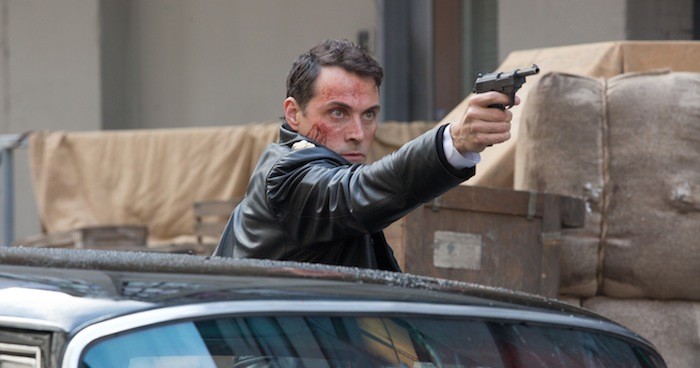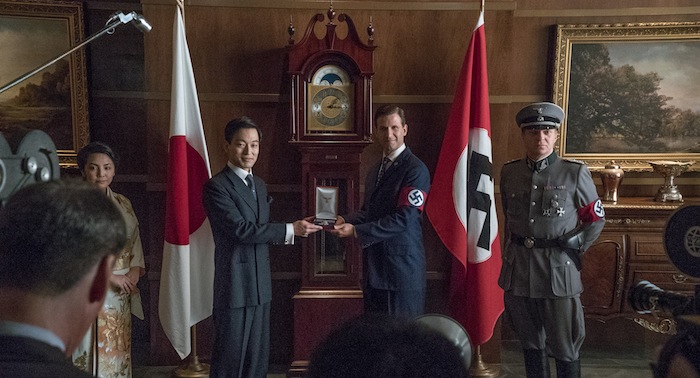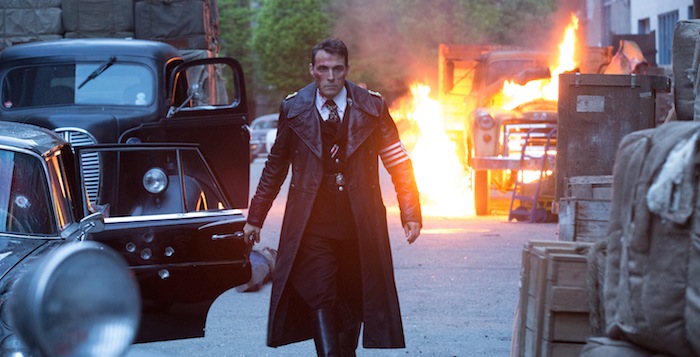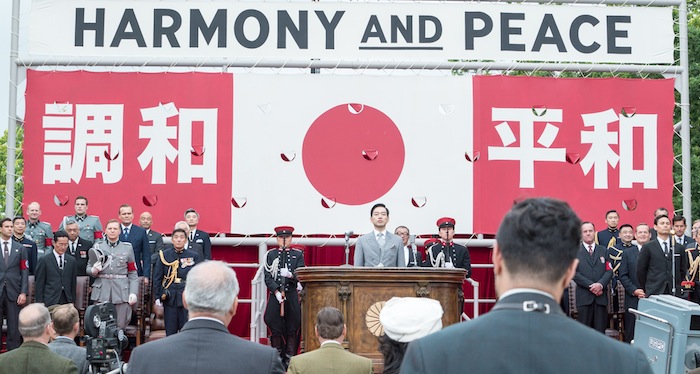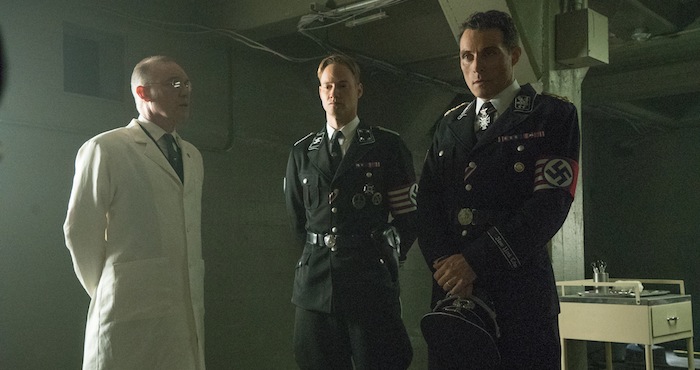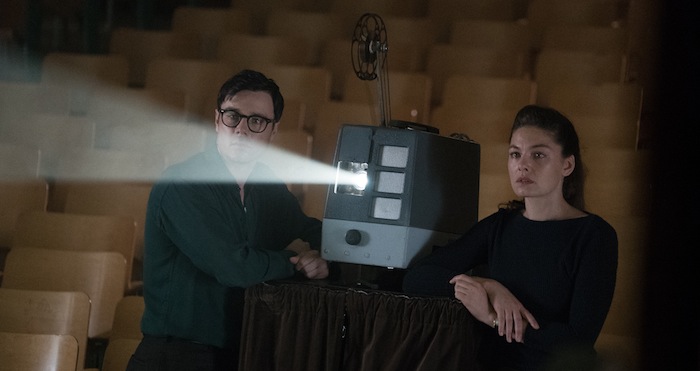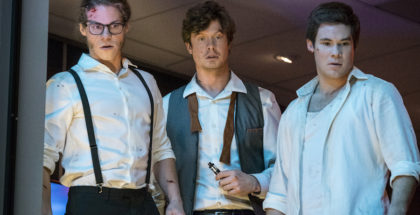Interview: Rufus Sewell talks The Man in the High Castle
David Farnor | On 22, Nov 2015
Rupert Sewell has had a successful career. He’s been in projects big and small, screened and staged, serialised and streamed. He’s highly regarded, regularly applauded, and even swooned over, thanks to his heartthrob looks and, after a run of TV hits in the 1990s, his charmingly villainous turn as Count Adhemar in A Knight’s Tale. But to hear him talk about his career, he’s only just figuring it out.
That’s primarily because for the last three decades, he’s had the label of “Next Big Thing” weighing on his shoulders – something that never really happened. Opportunity knocked, but the door didn’t lead to stairs going up.
It’s a sign of how esteemed he is, though, that he’s one of the leads in Amazon’s high-profile new series, The Man in the High Castle. An alternate history thriller that asks what it would be like if the Nazis and Japan forces won World War II, it’s based on the book by Philip K. Dick, whose name is as much a calling card for the show as Sewell’s. (He plays a Nazi officer, John Smith, with a knack for hunting down members of an underground revolution.)
“When [Zen] was cancelled, I was delighted.”
Rufus is very down-to-earth about it all, an attitude he has towards everything from typecasting to the dodgy phone connection between us late on a weekday evening. That’s partly born, you suspect, from many years of almost-stardom. It’s not long, for example, since his excellent detective series, Zen, was cancelled by the BBC after just one season.
“To tell the truth, I wasn’t surprised,” he says, adopting a candid tone that swiftly becomes the norm during our chat. “Before we’d even finished the second one, we were very aware that Danny Cohen and his cohorts at the BBC didn’t like it. So their reasoning about there being too many white detectives… I think that was all true but that doesn’t necessarily mean the truth can’t be used as a lie. It wasn’t really successful enough for their hand to be forced. The alternative was to do a kind of washed-down version pushed in the direction of the tastes of the people who didn’t like it. So when it was cancelled, I was delighted.”
Perhaps one of the reasons he’s happy to talk so openly is that Amazon is such a big step away from the traditional TV industry. Streaming services make it clear that they don’t care about ratings or other such things.
“You don’t have to deal with those characters!” he agrees, the relief audible. “The thing with Amazon, they basically, and [The Man in the High Castle’s creator] Frank Spotnitz talks very well about this, they just left us the fuck alone. They had notes, I’m sure, but as Frank said, they seemed to be keeping them to themselves! They weren’t worried about ratings – although I’m sure they are a bit more than they say – but they wanted it to be different. They wanted it to be the kind of thing that no one else would dare touch. They wanted to make a splash in that way. Which gives you confidence that if you do something out of the box and different that does not tick familiar boxes, then that’s actually what they want and you’re not going to be under pressure to kind of fit in to the nearest cliché.”
Cliches and boxes have always plagued Rufus’ career, but that lack of convention in Amazon’s studio is clearly making waves. The company is attracting more and more serious talent to its projects, from Jill Soloway and Steven Soderbergh to Spike Lee and Woody Allen. Talking to David Gordon Green (director of Red Oaks) and Transparent’s Golden Globe winner, Soloway, the line that Amazon doesn’t interfere with its creatives has been repeated so many times that it’s moved from rehearsed soundbite to surprising fact.
“It’s a pet peeve of mine,” Sewell tells us. “Anyone who’s ever agreed to do something because of all these peculiarities and you find out you have to be the guardian of these peculiarities and with every new iteration of the script you read – and I don’t mean Episode 1, 2 and 3, I just mean re-writes of the film or whatever – all of those things that made it what it was, if you’re not careful, because of panic, time constraints, fear of losing out to certain demographics or just someone re-writing something and half-remembering what it was, you know, you lose all of the detail and everything just becomes so homogenised.”
“[Amazon] just left us the fuck alone.”
In Amazon’s system, though, those pressures weren’t there. Indeed, it’s hard to imagine another broadcaster outside of the online arena giving a team such creative freedom, let alone on a series that involves Nazis ruling America. Only last weekend, the Guardian pulped its supplement, The Guide, because it used SS imagery on a cover relating to the show.
“Everything that was peculiar and different… particularly when you get into 5, 6, 7, 8, 9, and 10, all of those tiny little elements that could’ve been stamped out, if you weren’t careful in those first two episodes, start to dominate. The peculiarities become the actual thing itself,” adds Sewell.
“I think them being completely hands-off will occasionally lead to things, erm, going off the rails, but I think it’s worth it for the things that go right.”
He speaks with years of experience, but without the weariness that might go with them. He’s enthusiastically alert to the differences between High Castle’s script and a more typical, linear screenplay.
“You don’t have to be expository in the same way,” he observes. “People are watching it in swatches, chunks, sometimes maybe five [episodes] or even the whole thing in one go, so you don’t have to do recaps, because people aren’t watching a week later. You don’t need to say ‘So, as you were just saying yesterday…’, you don’t have to do that kind of thing. The proof of the pudding will be in the eating, but it makes for a slightly different writing style, where you don’t have to repeat things or say names all the time. It’s a bit more natural.”
Rufus came on board the project at the beginning of 2015, just as he was starring in a West End production of Closer. He was cautious, even though he thought Episode 1 was “very good”. With John Smith a new character added for the screen, he was concerned they just looking for “some one-dimensional figure, who’s just like evil and blah blah blah blah”, which would be “not interesting” to him.
“As an exercise, it would be, if I hadn’t done it before,” he reflects. “You know, but even then, I’d try my best to push it in the other direction.
“But I was assured that there was more to this character and actually, as the show progresses, you start to see a lot more dimensions – not just the standard bullshit they say to any old actor who doesn’t want to play a boring bad guy, but genuinely, that facade starts to crack open, relatively quickly.”
“The interesting, the horrifying thing about Nazis is they were people,”
He asked to read Episode 2 immediately, which includes scenes with Smith’s family and even a shootout, both of which give us an insight into the character.
“It’s funny, you see it from his perspective,” he notes. “There’s an element which is kind of ‘Yeah, shoot those guys…’ and you think ‘Hold on!’ It’s very confusing. It plays with that. Then you start to understand how people can become indoctrinated.”
As if to emphasise his taste for different perspectives, he took the job on at the same time as another: Caiaphas in the National Geographic Channel’s miniseries, Killing Jesus, also made by Ridley Scott’s production company, Scott Free.
“I thought I’d have to make a choice as to whether I played this SS head of the Nazis or the head of the Jews in Killing Jesus, which was an interesting choice!” he explains, with a smile. “But because it was the same production company, I did both! So I did two days of Nazi-ing, then I got on a plane to Morocco. A day and a half later, I was fully bearded and trying to get Jesus crucified.”
He describes it wryly as “an exercise in versatility”, but the words “success” and “versatile” keep cropping up. You get the impression that he’s often made a concerted effort to escape the trappings of familiar parts. But how difficult was it to get into the mindset of a Nazi, while swapping roles so quickly?
“I don’t know what kind of mindset I was trying to get into. The danger when you think that way is if you’re not careful, you veer towards all those signifiers and all the cliches. You start to become kind of Teutonic. And you speak in a clipped way. And your body becomes ramrod straight. And you become humourless… The least interesting thing about a person is their uniform, you know? So for me, it wasn’t about, rather than get into the mindset of a Nazi, it was remaining in the mindset of a human being and still playing it. If you leave your humanity behind, you’re just doing what everyone else does.”
“The interesting, the horrifying thing about Nazis is they were people,” he continues, warming to the subject. “They would go home and they would be good dads or bad dads or indifferent dads or they had generosity that came out in some way. The people who started Nazism were, almost to a fault, degenerate, monstrous, emotionally deformed people. But the followers, when you talk in terms of all of Germany, to all other intents and purposes, were honourable people, who considered themselves to be loving and who managed to find themselves warped. And that’s what I found myself more interested in.”
He did a lot of research into Germany, including accounts of Nazism from different perspectives.
“I was curious as to how it could happen. There was obvious historical precedence, but just in terms of mind control of the masses and the media and what we believe and the outs we’re given, the excuses we’re given, to look the other way, that’s in existence, to a certain extent, everywhere at the moment, how you can be convinced of the inhumanity or the relative degrees of humanity of people depending on how far they are away. And the relative degrees of the fairness of what you’re doing relative to how much you’re believing about what you’re reading. The Germans at the time of Nazism absolutely swallowed hook, line and sinker the story they were given in the papers, that they were a victimised country, who needed to finally defend themselves against immigration from Poland… all of this crack stuff, but they were 100 per cent indoctrinated. And once you start to know that stuff and the idea of American Nazis believing themselves to be, as much as they possibly can, to be good people, it’s frightening. The more human you make it, the more frightening it is, I reckon.”
When you probe that way of thinking about such disturbing characters, how it’s developed over the years, it’s telling just how introspective the reply is. that he replies with something far more introspective. The notion of success rears its head once again without prompting.
“I’m not very good at measuring success,” he says. “As far as I’m concerned, what makes me feel like I’m achieving something, what makes me feel satisfied is feeling total… to see something through someone else’s eyes as though it were my own. Even if it’s something that’s quite horrifying. I don’t know. I don’t know. I guess it’s developing. Sometimes, if you wander away from your past, so to speak, those are the best things you can do in terms of learning what you need to do.”
He finishes. “Sorry if that sounds very vague!”
“I’ve just gone from playing a bit of a shit to an entitled ponce. So surely that counts as versatility!”
That mix of wayward musing and frank humour makes for a rare, honest appraisal of an actor’s own work. It’s a state he’s arrived at after eight years of living in Los Angeles, a move that came about partly due to a lack of work in the UK.
“I had a girlfriend and flat, which I hadn’t had for a while!” he laughs. “So I stayed. But I stayed for the relationship, really. It wasn’t for the career.”
Being there, though – a “very quiet, non-showbiz lifestyle” – bizarrely led to more work in Europe.
“Somehow the trick was unavailability!” he jokes.
As we speak, he’s back on British soil once more to film ITV’s Victoria, in which he plays Lord Melbourne – “a fascinating character” – alongside Doctor Who’s Jenna Coleman. He’s still mindful of that supposed typecasting. But now, he seems to embrace it.
“I was doing Man in the High Castle and thought, you know, I wouldn’t say one’s more like me than the other – not that I’m a Nazi or have any of those beliefs! – but both of those utilise me. Funnily enough, I think, both of these characters represent different attempted typecasts that have been pushed in my direction. Once it felt like for a long time, whenever I did something, people would describe me as a Regency-period, brooding, entitled ponce. And if it was American films, someone who was a bit of a shit. I’ve just gone from playing a bit of a shit to an entitled ponce. So surely that counts as versatility! To have two different stereotypes that I can inhabit!”
All he needs to do now is play a poncey shit, I remark. He laughs. “Well, I’ve done those too! I’m very, very versatile.”
The secret, apparently, is not caring.
“I can say that as a joke now because I don’t take that any of that seriously,” he says. “The people who do have that kind of opinion, I’m not sure they even exist. If I wanted to imagine that people thought that, the only person who would worry would be me. I don’t have any problem with playing different types of roles. And going from one very different part to another, it’s great fun. It’s just been fun, you know?”
Almost as a reflex, he starts to evaluate it in terms of how successful it will be – but stops himself.
“I’m managing finally in my later middle years to, I think, disengage myself from the concern about the relative success or un-success of things I do, because for a start, I’m no bloody good at guessing and I’m certainly no good at pushing my career this direction or that! The best thing I can do is just do my best work and just try to enjoy it. The rest is so completely out of my hands.”
“It made me feel good that I was with a company that had class taste.”
He’s equally upbeat about the future of television.
“What used to be the province of mid-medium budget independent films, they don’t exist anymore. Not in the same way. That kind of brave studio filmmaking and the kind of mid-budget independent films that attracted the great writers and directors and upcoming writers and directors, now, that place seems to slowly be taken by long-form television. That’s where all those great people are going.”
He already had subscriptions to Netflix and Amazon Prime before The Man in the High Castle, citing Transparent and Bloodline as two recent highlights. Even Amazon’s decision to buy the rights for Channel 4’s Catastrophe seems like fortunate timing.
“When I was doing Closer, I was watching Catastrophe. I just thought it was fantastic. Then I moved back [to LA] and we couldn’t get any more of it! So [I was delighted] when Amazon picked it up, not only because I got to see the rest of it, but also because they’ve got such good taste! So for me, that’s not an original, but it made me feel good that I was with a company that had class taste.”
There’s still that concern over what he’s achieved – he confesses to being “slightly… impatient or frustrated about not being really as much a part of the British film industry as much as I would’ve liked” – but it’s laced with optimism.
“It seems like if one can accidentally find oneself in a series like The Man in the High Castle,” he adds, “you think ‘Hold on, this could actually be an incredibly satisfying job!'”
At the age of 48, things appear to be finally clicking into place for Rufus. Instead of looking back at his career, he’s looking forward.
“[The Man in the High Castle is] the only time I’ve ever been in a position where I’ve wanted something to be picked up for a second season,” he reveals. “I can’t say I’ve ever felt that way before. Normally, I just like to hit and run. I like my freedom too much. But with this, the prospects of where it could go are kind of dizzying, so it doesn’t feel like a limitation on one’s future – the thought of a long-running series always felt that way before.”
Who knows? He might be the next big thing.
All episodes of The Man in the High Castle are now available exclusively on Amazon Prime Video, as part of a £5.99 monthly subscription – or, if you want free next-day UK delivery on Amazon products too, as part of a full £79 annual Amazon Prime membership. Read our spoiler-free review of The Man in the High Castle.
You can listen to a slightly longer version of this interview on our podcast here, in which we also review Amazon’s new show.


